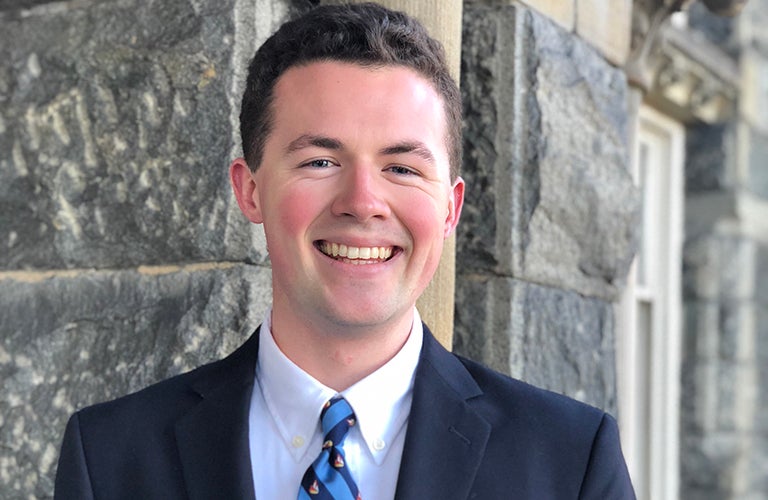Mulcahey Awarded Goldwater Scholarship

Biochemistry major Patrick Mulcahey (C’19) has won a Goldwater Scholarship, awarded annually to students excelling in mathematics, engineering, and the natural sciences. (Photo: Melissa Gonzalez C’18)
April 12, 2018 — Georgetown College biochemistry major Patrick Mulcahey (C’19) has been awarded a Barry Goldwater Scholarship, a prestigious national scholarship given to students who excel in mathematics, engineering, and the natural sciences.
Jane Donnelly (C’19) and Matthew Park (C’19) were also recognized with honorable mentions from the Goldwater Foundation. This is the first time three of Georgetown’s four annual Goldwater nominees have been chosen as scholarship winners.
Mulcahey’s award marks the second consecutive year — and third year in the last five — that a Georgetown College student has received a Goldwater Scholarship. Ayan Mandal (C’18) won in 2017, and Sarah Waye (C’15) won in 2014.
“There have been points in my time doing research when nothing seems to work, regardless of how many hours I worked or thought about my project,” Mulcahey said. “Sometimes, these difficulties made me question whether a life of research was for me, or whether an M.D./Ph.D. was even reasonable. An award like the Goldwater Scholarship is an incredible reminder that scientific research is indeed my calling and that I’m on the right path to becoming a physician scientist.”
WINNER: PATRICK MULCAHEY
A native of Newtown, Penn., Mulcahey has compiled an impressive research record since arriving on the Hilltop in 2015. He began researching alongside Dr. Jong-in Hahm of the Department of Chemistry in his first semester; by his sophomore year, he started his own research project investigating the properties of zinc oxide nanomaterials.
“This work is but a matter of honest toil and persistence,” Mulcahey said. “I am grateful for people like my parents and my mentor, Dr. Hahm, for helping me keep that in mind even in the most difficult of moments.”
As part of his work in the Hahm lab, Mulcahey assisted in biotechnology research that led to publications in ACS Nano and Nanoscale, and which “could inform biomedical engineers and other medical professionals in the design of biocompatible devices and implants.”
“I am fascinated by the nano-bio interface — where the engineered technologies we make in our laboratories meet the intricacies of living systems,” Mulcahey said. “The problem of incorporating nanotechnology into living systems touches fields from brain mapping to cancer drug delivery to integrated bioelectronics.”
Mulcahey’s drive for intellectual exploration hasn’t been limited to the academic year: The junior has conducted research into sea lamprey neural regeneration at Temple University’s Lewis Katz School of Medicine. This summer, he will intern at the Singh Center for Nanotechnology at the University of Pennsylvania.
Like Mandal, Mulcahey hopes to pursue a combination M.D./Ph.D. program after he graduates next year. He anticipates that his chosen specialty of nanomaterials in biotechnology will lead him to work in some of medicine’s most exciting and unexplored frontiers.
“I am most excited about the specific issues — perhaps questions we haven’t even thought to ask yet — that my scientific career will lead me to consider and to try to understand,” Mulcahey said.
HONORABLE MENTIONS: JANE DONNELLY AND MATTHEW PARK
The two students to receive honorable mentions from the Goldwater Foundation have amassed impressive research records of their own.
Jane Donnelly (C’19) majors in biochemistry and minors in French. She has conducted research in Dr. Timothy Warren’s lab on the conversion of nitrite to nitric oxide in biologically important copper-center enzymes.
Like Mulcahey, Donnelly plans to pursue a combination M.D./Ph.D. program. She hopes to continue studying bioinorganic chemistry, particularly its application to neurodegenerative illness.
Matthew Park (C’19), a biological physics major with minors in biology and STIA (science, technology and international affairs), is currently researching cancer immunology in Dr. Anton Wellstein’s laboratory at the Lombardi Comprehensive Care Center. He has also investigated applications of plant hormones to pancreatic cancer treatment alongside the Department of Human Science’s Dr. Ronit Yarden.
After graduation, Park will attend the Icahn School of Medicine at Mount Sinai, where he received early admission in 2017. He hopes to develop a better understanding of the relationship between genetic abnormalities and cancer and to continue researching immunotherapeutic cancer treatments.